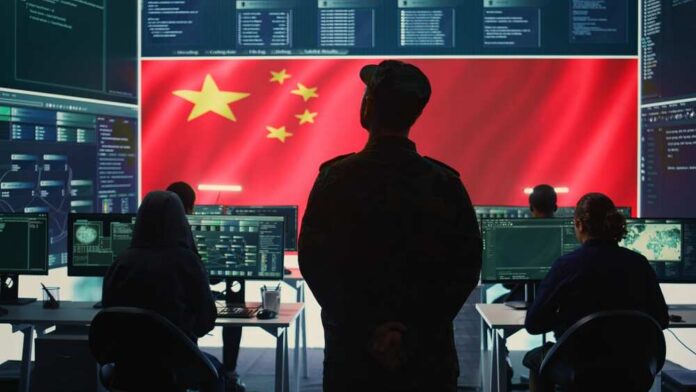
Chinese hackers are infiltrating America’s critical infrastructure, and you won’t believe what they can do.
The United States is under siege from an invisible enemy. Chinese hackers, particularly the group known as Volt Typhoon, have infiltrated critical U.S. infrastructure sectors including communications, energy, and water. These cyber intruders can potentially disrupt heating, air conditioning, data servers, control rooms, and surveillance systems. The FBI warns that this threat is massive and unrelenting, with the Chinese government posing a broad and persistent danger to America’s national security. As cyber incidents targeting essential sectors continue to rise, our nation faces unprecedented risks to its critical infrastructure, leaving many Americans unaware and woefully unprepared for the potential consequences.
The Extent of China’s Cyber Threat
FBI Director Christopher Wray didn’t mince words when he said, “The cyber threat posed by the Chinese government is massive.” This isn’t just fear-mongering; it’s a stark reality that’s been unfolding right under our noses. Volt Typhoon, China’s hacking group du jour, has been wreaking havoc on our critical infrastructure for years. These aren’t your run-of-the-mill script kiddies; we’re talking about sophisticated operatives who’ve been lurking in our networks, some for over five years, without detection.
What’s truly alarming is the scope of their infiltration. They’re not just poking around; they’ve burrowed deep into the systems that quite literally keep our country running. Communications, energy, water – you name it, they’ve probably hacked it. And let’s not forget about the potential for these cyber ne’er-do-wells to mess with our heating, air conditioning, data servers, and surveillance systems. It’s like they’ve got their fingers hovering over the off switch for modern American life.
China poses a significant threat to U.S. critical infrastructure. Tomorrow, @CISAJen will testify to the @committeeonccp on how we're working to secure the nation’s critical infrastructure from potential disruptive cyberattacks by the PRC.
Watch live:https://t.co/hfGqfm0Z6g https://t.co/xdY92baoXi— Cybersecurity and Infrastructure Security Agency (@CISAgov) January 30, 2024
The Sneaky Tactics of Chinese Hackers
Now, you might be wondering how these digital invaders have managed to stay undetected for so long. Well, it turns out they’re pretty crafty. Since 2021, Volt Typhoon has been exploiting vulnerabilities in networks protected by Fortinet’s FortiGuard security devices. That’s right, the very systems designed to keep us safe have become their playground. But it gets worse.
“The PRC [People’s Republic of China] has made it clear that it considers every sector that makes our society run as fair game in its bid to dominate on the world stage, and that its plan is to land low blows against civilian infrastructure to try to induce panic and break America’s will to resist.” – FBI Director Christopher Wray
These hackers are using outdated routers to remain undetected and escalate access privileges. It’s like they’re digital ninjas, slipping through the cracks of our cyber defenses. And they’re not just passing through; they’re setting up shop. As Wray puts it, they “live off the land,” persisting in our IT environments for years. It’s a sobering reminder that in the world of cybersecurity, sometimes the oldest tricks are the most effective.
The Broader Impact on American Security
Let’s not kid ourselves; this isn’t just about a few hackers causing mischief. We’re talking about a coordinated assault on the very foundations of our national security. The Justice Department’s disruption of a Chinese botnet in December is just the tip of the iceberg. These cyber intrusions are extensive, and they’re hitting us where it hurts.
“Although countless “bad players” are involved, communist China tops the list, says Huey.” – Craig Huey
Consider this: nearly 80% of organizations using industrial control systems reported security breaches in the past two years. That’s not just a statistic; it’s a five-alarm fire. Our critical infrastructure is so vulnerable that Moody’s labeled these assets as “credit negative.” When the bean counters start sweating, you know we’re in deep trouble.
The Urgent Need for Action
So, what are we doing about this digital onslaught? Well, CISA’s Cybersecurity Risk Information Sharing Program is trying to mitigate threats, but let’s be real – it’s like bringing a knife to a gunfight. Our energy sector plan is outdated, and our extensive utility network is a hacker’s paradise. We’re sitting ducks, and the hunters are getting bolder by the day.
The time for half-measures is over. We need robust, aggressive defenses against these cyber threats. Our energy sector plan needs a complete overhaul, and we need it yesterday. The Chinese government isn’t playing nice, and neither should we when it comes to protecting our digital borders. It’s time to wake up, America. The cyber war isn’t coming – it’s already here, and we’re losing. Let’s turn this ship around before it’s too late.














